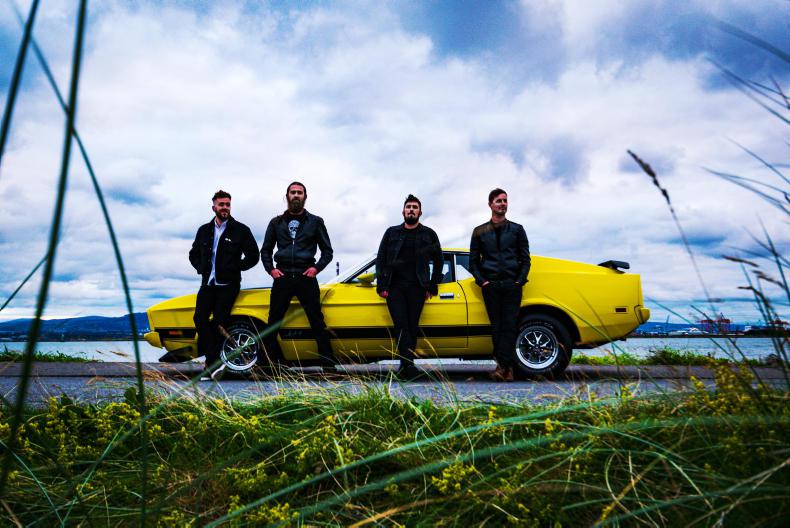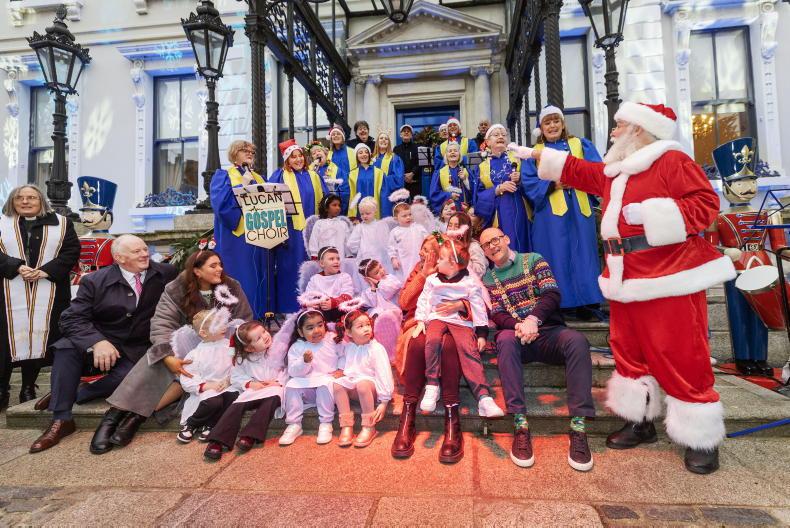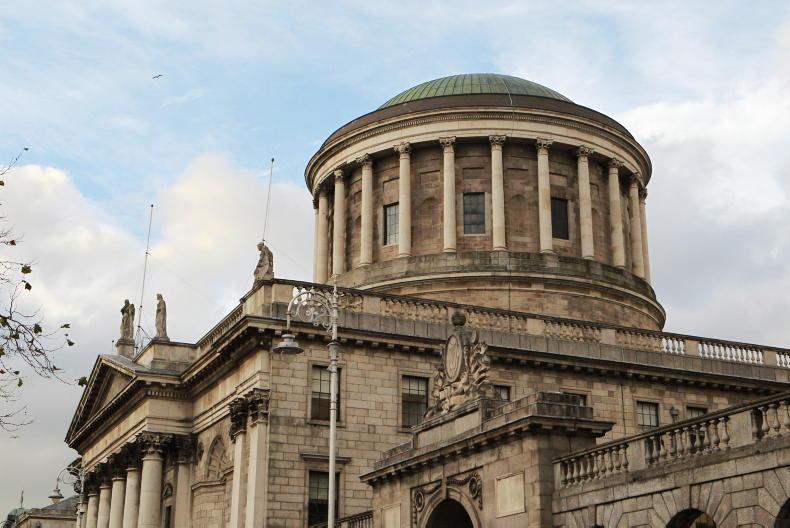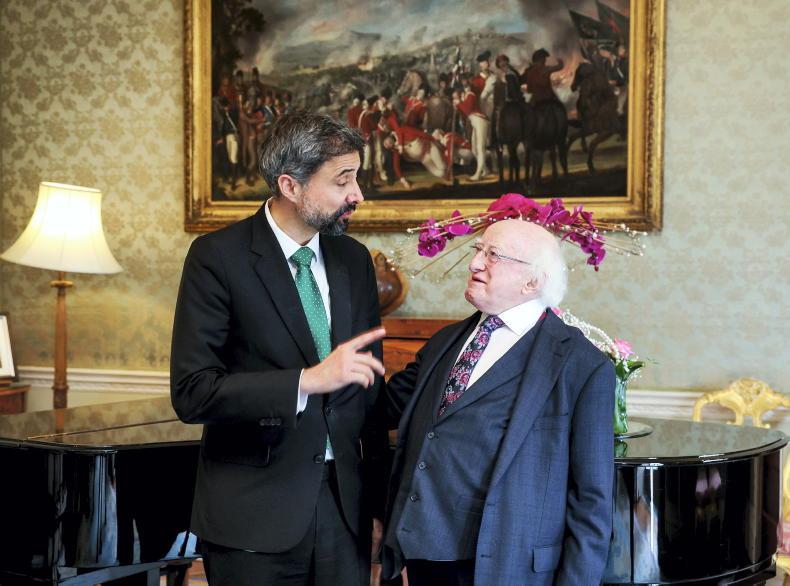The Riptide Movement came together when guitarist Jay Dalton and singer Mal Tuohy approached Gerry McGarry to play bass for their new band, but they still needed a drummer. Cue Jay, Gar Byrne and the Nightlink bus.
When Irish Country Living sits down with Gerry and Mal, Gerry recounts the story: “Jay saw a guy beside him on the bus with headphones on drumming away on his knees.
"Jay was like, ‘Are you a drummer by any chance?’ to which the reply was a confused, ‘Yeah’. Jay then asked, ‘Do you want to be in a band?’ Gar was still so confused so Jay gave him our demo and he loved it.
“We met up then and we did a rehearsal with him. It was just so organic. We hit the jackpot with Gar,” says Gerry.
And that was the start of The Riptide Movement in 2006. All of the band members are Dublin based, but both Mal and Gerry’s parents are from Roscommon.
The band’s first act was to get banned from the States for three years for not having the correct visa.
Nightmare – or maybe not. Mal describes it as a God send, because they then ended up going to London for three months and became the go to replacement band for promoters.
Travelling home, in a queue at Heathrow airport and the guy in front turned around and commented that he liked the Rory Gallagher t-shirt Jay was wearing.

The Riptide Movement are currently on their Something Special Tour and have released their EP on Vinyl and Spotify. \ Kevin Nolan
“Jay asked was he you familiar with his music and the man replied, ‘Oh yeah, I produced his first two albums’,” Mal recalls.
The man was Tony Colton, a very well-known producer. He produced The Riptide Movement’s first album. The band ambitiously ordered 10,000 CDs of What About the Tip Jars? believing they’d be an instant hit.
Unfortunately, not straight away. So they took inspiration from Grafton Street, where the band began busking and selling their CDs. The Riptide Movement credit their busking experience to being good live performers.
They sold all 10,000 CDs in a year and had to order more. The sale of the CDs helped finance their global selling album Getting Through, which Universal signed them for.
To go out and play to 40,000 is just easier because the crowd are with you and it’s just bang you’re into it
“We haven’t looked back,” smiles Mal. They started their Something Special tour in The Islington, London at the start of October and are playing a host of venues including the Olympia Theatre in Dublin and Mike the Pies in Listowel, Co Kerry.
“The bigger the stage the easier it is,” says Mal.
“To go out and play to 40,000 is just easier because the crowd are with you and it’s just bang you’re into it,” agrees Gerry.
“In smaller venues, you’ve got to let the songs breathe and pick your moments to bring up the chorus, you hear absolutely everything at a smaller venue and you can get a really cool vibe going.”
Social statements
As a band, The Riptide Movement likes to make social statements through their music, whether that be on climate change, mental health or the modern world we inhabit, explains Mal.
“Every album we’ve done, there has always been a social commentary on what’s happening at the time. You go right back though all our albums and it has always been there. We’re very much a band that has always had something to say and the evidence is in our songs.”
Probably their biggest song statement to date has been the release of two singles Plastic Oceans and What Will the Kids Say. The band spent much of 2017 developing a web series with Clean Coasts around plastic pollution in Irish waters, which incorporated these songs. They went diving along seabeds, trawling with fishermen and visited seal sanctuaries.
As well as walking the walk, the guys also talk the talk, as they have banned plastic from their tours. Gerry says they are sending out a message about the power of one person making a change.
We banned plastic from our tour rider
“If we all come together for the planet, you can look back on it and be proud, saying, ‘We acknowledge the fact that we were going down a road that maybe can’t be reversed, but we will try, we won’t give up now’.
“We said listen, ‘We’ll try and do that’. We banned plastic from our tour rider. We’re the first band to go out there and go, ‘No, no plastic, we can’t do any plastic on our rider’,” explains Gerry.
Interestingly, as well as being progressive with regard to their touring, The Riptide Movement are also slightly retro in ways. Their latest EP Something Special is an eclectic mix of old and new in the sense that it has been released just on Spotify and vinyl. Most people, they say, are streaming music online and vinyl is also currently experiencing a significant resurgence.
“Generally, an album takes two years from writing it to demo-ing it, recording it, producing it and then actually releasing it,” explains Mal. “We were thinking, this is an awful lot of work and time to go into an album and people aren’t really listening to the whole thing (due to streaming).
“It’s like reading a book and just reading the first chapter and the seventh chapter. Speed reading a book, you don’t get the full picture. An EP is normally only four or five tracks, but we have seven on the vinyl and five on Spotify. So in a way, we are releasing a mini album, we are staying traditional with the vinyl, but we are also in the streaming world as well.”
For more information on The Riptide Movement’s Something Special tour and EP see www.riptidemovement.com
Read more
Keywest: 'busking shaped us'
Homegrown talent: Little Hours
The Riptide Movement came together when guitarist Jay Dalton and singer Mal Tuohy approached Gerry McGarry to play bass for their new band, but they still needed a drummer. Cue Jay, Gar Byrne and the Nightlink bus.
When Irish Country Living sits down with Gerry and Mal, Gerry recounts the story: “Jay saw a guy beside him on the bus with headphones on drumming away on his knees.
"Jay was like, ‘Are you a drummer by any chance?’ to which the reply was a confused, ‘Yeah’. Jay then asked, ‘Do you want to be in a band?’ Gar was still so confused so Jay gave him our demo and he loved it.
“We met up then and we did a rehearsal with him. It was just so organic. We hit the jackpot with Gar,” says Gerry.
And that was the start of The Riptide Movement in 2006. All of the band members are Dublin based, but both Mal and Gerry’s parents are from Roscommon.
The band’s first act was to get banned from the States for three years for not having the correct visa.
Nightmare – or maybe not. Mal describes it as a God send, because they then ended up going to London for three months and became the go to replacement band for promoters.
Travelling home, in a queue at Heathrow airport and the guy in front turned around and commented that he liked the Rory Gallagher t-shirt Jay was wearing.

The Riptide Movement are currently on their Something Special Tour and have released their EP on Vinyl and Spotify. \ Kevin Nolan
“Jay asked was he you familiar with his music and the man replied, ‘Oh yeah, I produced his first two albums’,” Mal recalls.
The man was Tony Colton, a very well-known producer. He produced The Riptide Movement’s first album. The band ambitiously ordered 10,000 CDs of What About the Tip Jars? believing they’d be an instant hit.
Unfortunately, not straight away. So they took inspiration from Grafton Street, where the band began busking and selling their CDs. The Riptide Movement credit their busking experience to being good live performers.
They sold all 10,000 CDs in a year and had to order more. The sale of the CDs helped finance their global selling album Getting Through, which Universal signed them for.
To go out and play to 40,000 is just easier because the crowd are with you and it’s just bang you’re into it
“We haven’t looked back,” smiles Mal. They started their Something Special tour in The Islington, London at the start of October and are playing a host of venues including the Olympia Theatre in Dublin and Mike the Pies in Listowel, Co Kerry.
“The bigger the stage the easier it is,” says Mal.
“To go out and play to 40,000 is just easier because the crowd are with you and it’s just bang you’re into it,” agrees Gerry.
“In smaller venues, you’ve got to let the songs breathe and pick your moments to bring up the chorus, you hear absolutely everything at a smaller venue and you can get a really cool vibe going.”
Social statements
As a band, The Riptide Movement likes to make social statements through their music, whether that be on climate change, mental health or the modern world we inhabit, explains Mal.
“Every album we’ve done, there has always been a social commentary on what’s happening at the time. You go right back though all our albums and it has always been there. We’re very much a band that has always had something to say and the evidence is in our songs.”
Probably their biggest song statement to date has been the release of two singles Plastic Oceans and What Will the Kids Say. The band spent much of 2017 developing a web series with Clean Coasts around plastic pollution in Irish waters, which incorporated these songs. They went diving along seabeds, trawling with fishermen and visited seal sanctuaries.
As well as walking the walk, the guys also talk the talk, as they have banned plastic from their tours. Gerry says they are sending out a message about the power of one person making a change.
We banned plastic from our tour rider
“If we all come together for the planet, you can look back on it and be proud, saying, ‘We acknowledge the fact that we were going down a road that maybe can’t be reversed, but we will try, we won’t give up now’.
“We said listen, ‘We’ll try and do that’. We banned plastic from our tour rider. We’re the first band to go out there and go, ‘No, no plastic, we can’t do any plastic on our rider’,” explains Gerry.
Interestingly, as well as being progressive with regard to their touring, The Riptide Movement are also slightly retro in ways. Their latest EP Something Special is an eclectic mix of old and new in the sense that it has been released just on Spotify and vinyl. Most people, they say, are streaming music online and vinyl is also currently experiencing a significant resurgence.
“Generally, an album takes two years from writing it to demo-ing it, recording it, producing it and then actually releasing it,” explains Mal. “We were thinking, this is an awful lot of work and time to go into an album and people aren’t really listening to the whole thing (due to streaming).
“It’s like reading a book and just reading the first chapter and the seventh chapter. Speed reading a book, you don’t get the full picture. An EP is normally only four or five tracks, but we have seven on the vinyl and five on Spotify. So in a way, we are releasing a mini album, we are staying traditional with the vinyl, but we are also in the streaming world as well.”
For more information on The Riptide Movement’s Something Special tour and EP see www.riptidemovement.com
Read more
Keywest: 'busking shaped us'
Homegrown talent: Little Hours










SHARING OPTIONS